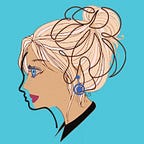April Book Review: Invisible Women
Gabriela is a Bookstagramer from Norway. For our March book review, she decided to talk about Invisible Women by Caroline Criado Perez.
“I love the fact that you get lost in another world. That you get to live in other characters. And I love fantasy. I have a very vivid imagination, and fantasy brings that out more, it’s fun to make your own movie in your head. The better the author is with words, the more it becomes alive” dreams happily Gabby when talking about books.
Fantasy love and mixing it up
Gabriela is a Bookstagramer from Norway. She started her account back in 2017, to talk about the books she read. She found a community. “It’s really nice to have other people who are bookworms with whom you can discuss books and get the hype”.
While she is a heavy fantasy and science fiction reader, she’s also using Bookstagram as a place to get inspiration and expand. For the past two years, she has been trying to broaden her readings and bring in some classics to the mix. It has brought happy surprises, such as George Orwell or James Baldwin, of whom she’s now very fond.
But her main love is still for fantasy books, with Red Rising among her favorites, a “Hunger games on steroid” Gabby laughs. She also loves Philipe Pullman His Dark Materials, and Games of Thrones.
Exposing the data bias that we have in society
And yet, when asked about a book to review for Mooi, Gabby went another way. She decided to go for one of the top books that impressed her in 2020, and it’s wasn’t fantasy.
“This book is basically saying that the work is designed by men for men”
“I consider myself a very modern woman. I’m a feminist, and I’m proud of it. I think it’s important that we have that as part of who we are. And this book kind of just blew my mind.”
Recommended by a friend of hers, Invisible Women by Caroline Criado Perez is a book exposing the data bias that we have in society. “Basically saying that the work is designed by men for men”.
For Gabby, it was incredible. “I don’t know what I was expecting when I got into it, because I remember other people saying, you HAVE to read this book, it’s really upsetting. I thought, how bad can it really be? Well … really bad”.
She warns against the heaviness of the book. “It’s really a lot of statistics, a lot of research, data. It is very well done, yet sometimes hard to get through. But worth it in the end”.
A fuel to discussions about change
The author gets into all the unconscious bias. Some things as random as why phones have a certain size, or why the temperature in buildings is designed to fit men but not women. One of the examples that shocked Gabby the most was the piano keyboard: made for a men’s hand, not a woman, provoking injuries on smaller hands. “They discovered that because a MAN with smaller hands got injured” she points out, astonished. “Maybe because I’ve been trying to learn the piano myself, but this one hit on a very personal level”.
“I remember reading it and having to take a few breaks in between because I was just so upset about it. It really makes you wake up a little bit”.
Gabby loved to get proper explanations for all the things she wondered about before. She found it very enlightening.
“Here you have a book that looked at the numbers and can tell: here’s the difference. And you can’t argue that away”
“Some people say, we don’t need feminists in the west, we don’t need to think about equality, we already have it. And sure, we came a long way, but there’s still a lot of bias. It should at least be discussed” Gabby reflects.
She always thought of herself as a feminist, even when she was younger. But she also realizes that she became much more awake while growing up. “Because you start to get into situations at work or in regular life where you are treated differently. Why, just because I’m a girl? That’s not ok”.
What she loved about Invisible Women is the data and numbers as fuel for future discussions.
“A lot of people, and a lot of men, are saying that we have an equal society, numbers-wise in Norway, and I’ve always argued but never had the scientific argument to prove anything against it. Here you have a book that looked at the numbers and can tell, here’s the difference. And you can’t argue that away”.
For Gabby, everyone should read it. “It gives you an understanding of where women are coming from when we say we are experiencing a bias”. And that’s a discussion we should all be having.
— — -
Follow Mooi Publication for more amazing book reviews here
